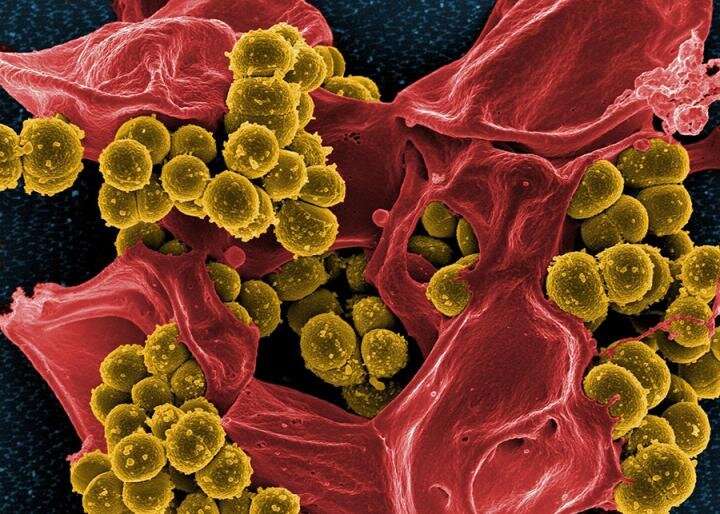Bacteria overcome hurdles to jump between species

Bacteria can overcome significant challenges to transfer from one species and flourish in another, research has shown.
Studies of the bacterium Staphylococcus aureus, which can cause infections in people and animals, have shown for the first time how it can rapidly adapt to new species.
Scientists used a newly developed model to study how pathogens can transfer from humans to sheep.
Population challenge
A team of researchers, including scientists from the Roslin Institute, analysed the genomes of bacteria of human origin during experimental infection of the mammary glands of sheep.
Continuous feeding of lambs by the ewes resulted in a reduction in the number of bacteria. This also occurred upon transmission of the infection to other sheep.
Overall, this had the effect of diminishing genetic variation—a process known as genetic drift, which limits the capacity for bacteria to adapt to a new habitat.
In spite of this challenge, bacteria were able to readily acquire genetic mutations that enabled them to quickly adapt to survive in the new host species, the researchers observed.
Infection insights
The findings shed light on how some bacteria have the ability to switch host species, leading to the emergence of new endemic or epidemic diseases.
Understanding how the genes in bacteria adapt to new species could help inform research towards tackling cross-species infections.
"Understanding how bacteria adapt to cause infection in a new species or individual may be key to controlling them. Our study has shown the resilience of bacteria to establish themselves in new environments despite significant physiological and population level challenges," Ross Fitzgerald, Group Leader, Roslin Institute, said.
The research was carried out in collaboration with the University of Glasgow together with the Instituto Valenciano de Investigaciones Agrarias and the Instituto de Investigación Sanitaria La Fe in Spain. It was published in Science Advances with funding from the Wellcome Trust, Biotechnology and Biological Sciences Research Council and the Medical Research Council.
"It was remarkable that in spite of the apparent genetic drift that occurred during infection and after transmissions, we found that the bacteria could adapt to the new host species," Rodrigo Bacigalupe, a Ph.D. student at Roslin Institute, said.
More information: Rodrigo Bacigalupe et al. A multihost bacterial pathogen overcomes continuous population bottlenecks to adapt to new host species, Science Advances (2019). DOI: 10.1126/sciadv.aax0063
Journal information: Science Advances
Provided by University of Edinburgh





















